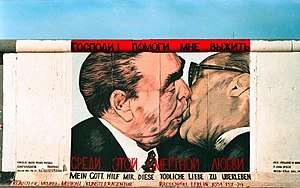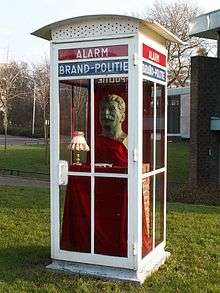Sots Art
Often referred to as “Soviet Pop Art”, Sots Art or soc art (Russian: Соц-арт, short for Socialist Art) originated in the Soviet Union in the early 1970s as a reaction against the official aesthetic doctrine of the state— socialist realism, which was marked by reverential depictions of workers, peasants living happily in their communes, and, during Stalinism, a young, fit Joseph Stalin.
Vitaly Komar and Alexander Melamid are credited with the invention of the term "Sots Art"; in an analogy with the Western pop art movement, which incorporated the kitchy elements of the Western mass culture, sots art capitalized on the imagery of the Socialist mass culture.[1]
According to Arthur Danto, Sots Art's attack on official styles is similar in intent to American pop art and German capitalist realism.[2]
Artists
- Grisha Bruskin
- Eric Bulatov
- Vitaly Komar
- Alexander Kosolapov
- Igor Novikov (painter)
- Alexander Melamid
- Dmitri Prigov
- Leonid Sokov
References
- "The Post-Utopian Art of Vitaly Komar & Aleksandr Melamid (Sots Art: 1970s, '80s)".
- Arthur Coleman Danto, After the End of Art: contemporary art and the pale of history, Princeton University Press, 1997, p126. ISBN 0-691-00299-1
Further reading
- Regina Khidekel, It’s the Real Thing: Soviet Sots-art and American Pop-art. Minnesota University Press, 1988
- Forbidden Art: The Postwar Russian Avant-Garde, Distributed Art Publishers, Inc.,1999, ISBN 978-1881616917

